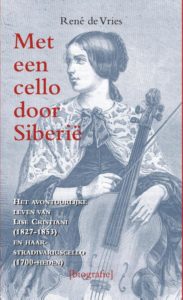‘Met een cello door Siberië’ (With a cello through Siberia) by René de Vries.
The adventurous life of cellist Lise Cristiani who was the first woman to perform in public in the mid-19th century. The writer travels in thetrails of Cristiani, hoping to learn more about her and her Stradivarius cello.
Antonio Stradivari(us), the famous violin builder from Cremona mainly built violins, but also 70 to 80 cellos.
Mendelssohn dedicated the song Lied ohne Worte op. 109 to Cristiani. This was published in 1868, when both Lise Cristiani and Mendelssohn were long gone. Mendelssohn heard her play in Leipzig in 1845 when she was 17 years old. Lise met Mendelssohn at his home.
She generally played adaptations of popular melodies like Schubert, Donizetti, Ernst. And also original compositions of Offenbach, Franchomme and others.
Through Adrien Servais, a Belgian cellist and later on composer, she met people in St. Petersburg.
In the mid-19th century, St. Petersburg didn’t really have a concert tradition. There were no conservatoires, hardly any concert halls, except maybe one for the tsar, and most performances were given by foreign musicians.
Lise Cristiani, our main character, hopes the audience doesn’t just show up to see a female cello player, but to truly come for the music. In those days is would have been unusual, inappropriate even for a woman to play the violin or cello as it showed too much of the female anatomy. So why not take up the piano? Not Lise!
After St. Petersburg she travels to Moscow and on to Siberia, all long journey in uncomfortable carriages and not to mention the cold. Sometimes the roads are so bad, she has to travel on horseback, through the mud and rain.
At the banks of the river Lena, Lise meets the Yakuts. Their language is embedded with a harsh, guttural dialect. Lise reckons the only way to master this language, is to be hanged 5 times. For them, she doesn’t pull out her cello, who she lovingly calls Antionio.
She goes on a near impossible journey, enterprising and enjoying her succes, which isn’t always a given.
She loved to play La Romanesca by Belgian composer Adrien Servais, who she met through her acquaintances in St. Petersburg.
After that, we play the music of Auguste Franchomme, which she also performed often, variations on Russian and Scottish themes and a Russian Air, and music of Alexander Batta, who was born in Maastricht and of whom Lise caught a cello performance in Paris. That concert had a big impact on Lise. It made her want to learn to play the cello, because the instrument would sing so beautifully. Batta’s duo for cello and piano is a paraphrase on a melody from an opera by Meyerbeer: Robert le Diable. Opera, or rather Grand Opera was very popular in Paris at the time, which is why many paraphrases were written in those days.
We learn a lot about Lise Cristiani’s character. From her concert travels from Paris and Berlin to St. Petersburg and Siberia, and that she contracts cholera on her way home and unfortuenatly dies at the age of 27.
But the cello that was built in the early 1700’s by Stradivarius, is very much alive. The end of the book is thrilling, because the writer in on the track of the instrument.
1a. Felix Mendelssohn: Lied ohne Worte in D op. 109
Performers: Maria Kliegel, cello & Kristin Merscher, piano.
CD: Mendelssohn Cello Sonatas n.1 & 2 8550655
1b. Adrien Francois Servais: La Romanesca
Performers: Viviane Spanoghe, cello & Andre De Groote, piano.
CD: Souvenir Festival Servais 2007 (C 001162)
1c. Auguste Franchomme: Variations sur des thèmes russes écossais op.6 & Deuxième air russe varié op. 32
Performers: Ensemble Explorations under the direction of Roel Dieltiens
CD: Franchomme HMC 901610 Le Violoncelle virtuose tr. 1 & 8
1d. Alexander Batta: Robert le Diable, duo pour piano et violoncelle.
Perfomers: Doris Hochscheid, cello & Frans van Ruth, piano.
CD: Dutch Violoncello sonatas Vol 7 Audiomax tr. 3

The latest news regarding the store’s future.
|
Hooray, good news! We’ve won the court case! Dear friends, last week you learned that the verdict would be given on 7 December, but to our surprise the judge made a decision. vrienden, eind vorige week kregen jullie bericht van ons dat de uitspraak pas 7 december a.s. zou plaatsvinden. Tot onze verrassing heeft de rechter besloten nu al zijn vonnis te vellen. This is a definitive decree: All the landlord’s claims have been rejected! We are not out of the woods yet as our opponent can appeal to a higher court, but we have won this battle. For now, we stay where we are. So it’s on to a wonderful 25 ½ anniversary in the spring of 2017! Last week a favourite to console us, now a favourite to celeberate a happy ending! We stay in Russia: “De gloed van Sint Petersburg” (The glow of Saint Petersburg) by Jan Brokken. Two weeks ago, we attented a presentation of this beautiful, illustrated literary guide, filled with stories about writers, poets, musicians and composers. The passion of “De Kozakkentuin” combined with the knowledge of “Baltische Zielen” and the compassion of “In het huis van de dichter”! “Alles in deze stad stemt tot nadenken, kijken, herinneren; alles duwt me bijna onmerkbaar naar ontroostbare melancholie.” (Everything in this city gives food for thought, for looking, remembering: everything pushes me almost unnoticed into a inconsolable melancholy.)
|








